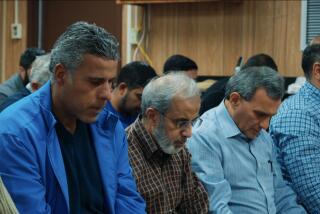Muslims Are Challenging the Forces of Repression
- Share via
One year ago this week a devout elderly Muslim, Mahmoud Mohammed Taha, was publicly hanged in Sudan’s capital for the “offense” of defending the faith against radical fanaticism. He went to his death in a brutal manner as 2,000 fanatics cheered with shouts of Allah akbar --”God is great.”
In the ensuing months this sad event has been turned into a positive movement for human rights in the Islamic world, and this week thousands of people were expected to gather in Khartoum for public commemorations of the revered teacher’s martyrdom.
This is extremely significant. Taha, 76 years old at the time of his death, was an engineer by profession and sufi (Muslim mystic) by personal discipline. In response to this one man’s willingness to die gracefully for the liberty and dignity of all men and women, many Muslims are now standing for human rights in the face of religious fanaticism and intimidation. God is truly great in ways in which the fanatics fail to appreciate.
The proponents of the literal application of the ancient Islamic code, the sharia, propose to establish autocratic, oppressive “Islamic” states, along the Iranian model, throughout the Muslim world. Their vision of Islamic law relegates women and non-Muslims to the status of second- and third-class citizens. The mutilation of criminal offenders, suppression of political opponents and international terrorism in the name of jihad (holy war) are their primary contributions to civilization.
In contrast, Taha advocated the application of the fundamental principles of justice and equality revealed to the Prophet Mohammed. Taha maintained that some aspects of sharia were social, not theological--that they reflected the situation of the first Muslim state, Medina, a 7th-Century community in Arabia. Taha taught that Islam has more to offer, and suggested ways in which today’s Muslims may identify and enact the universal aspects of their religion to achieve civil, political and economic equality and justice regardless of sex or religion, thereby contributing to human progress.
Over the course of 40 years many people were drawn to Taha’s vision of a more just society under the precepts of Islam, and referred to him as ustadh-- revered teacher. His followers were known as the Republican Brothers (though nearly half were women), and were outlawed as a political organization.
In 1983 Gen. Jaafar Numeiri, then president of Sudan, decided to transform the country into an autocratic “Islamic” state, and he had Taha and his leading followers detained without trial. Continuing pressure by international human-rights groups apparently prompted the sudden unconditional release of the group in December, 1984. But Numeiri may have had a craftier motive. During that year he had replaced Sudan’s civil laws with the sharia. As might have been expected, within a week of their release Taha and his followers issued a protest leaflet, demanding the restoration of democratic freedoms so that the principle and manner of applying sharia could be debated freely by all Sudanese. The leaflet also asked for a political settlement for the civil war in the largely non-Muslim southern part of the country.
Taha and four of his followers were arrested again, and after a highly irregular two-hour trial were condemned to death. Since Taha was deemed intransigent in advocating “heretical” views, he was hanged immediately. The other four condemned men were “pardoned” after a humiliating public recantation. Seventy-six days later Numeiri was overthrown by a popular uprising, which was followed by a formal army coup d’etat.
Sudan is now governed by a joint military and civilian administration under a transitional constitution adopted last October. The future of sharia rule is supposed to be settled by a parliament to be elected in April. It seems doubtful, however, that such a fundamental issue will be determined by a general election.
The modern application of sharia confronts all Muslims with a genuine dilemma. They strongly feel the religious duty to conduct all of their public and private affairs in accordance with Islam. Many aspects of sharia, however, such as discrimination against women and non-Muslims, are clearly untenable today. Political oppression and religious intimidation are forcing many honest-thinking Muslims to ponder their predicament. Are they to give up their legitimate aspiration to enjoy basic individual liberties? Can they consent to the relegation of their female and non-Muslim compatriots to inferior status? Or are they to abandon their spiritual commitment to Islam?
Taha showed extraordinary honesty and courage in openly addressing this fundamental issue. But he did more: He provided an Islamic answer to the Muslim dilemma. That is why he has become the symbol of human rights for all Muslims.
The celebrations that are planned in his honor this week will clearly demonstrate that ideas live or die by their own merit and not by the fate of their individual proponents. They also will demonstrate the ability of Muslims to challenge the reactionary forces of violence within their community. Muslim fanatics must be denied the monopoly of legitimacy provided by an Islamic platform. They must be defeated, and they will be, I believe, as more and more Muslims are enlightened by the life and death of Ustadh Mahmoud Mohammed Taha.
More to Read
Sign up for Essential California
The most important California stories and recommendations in your inbox every morning.
You may occasionally receive promotional content from the Los Angeles Times.













